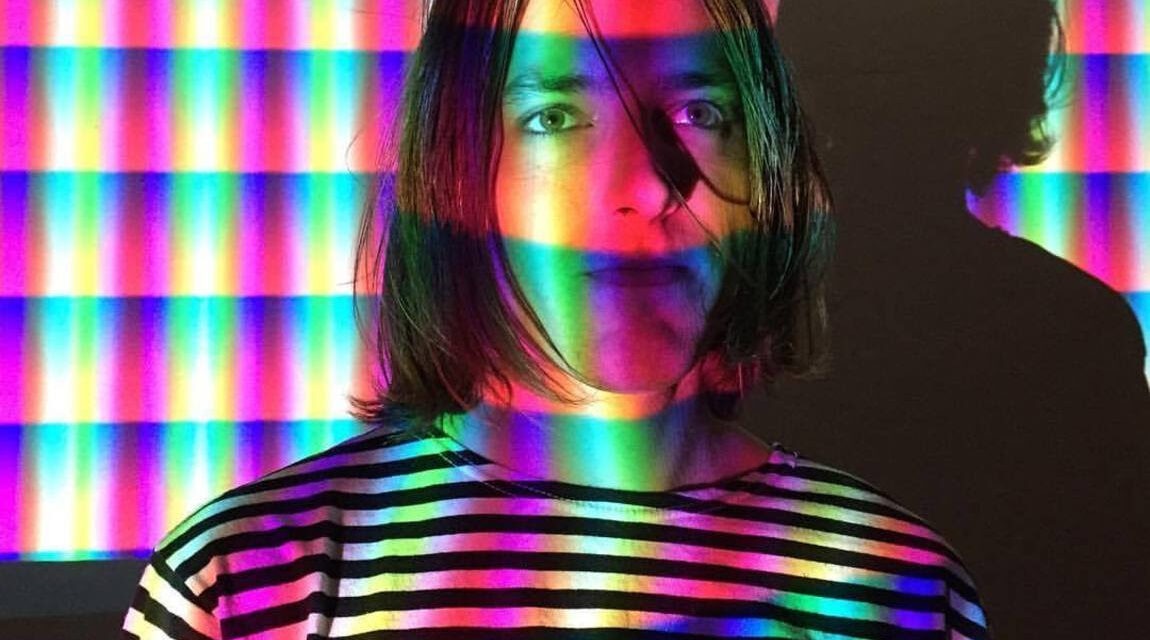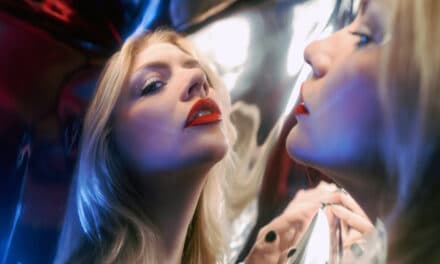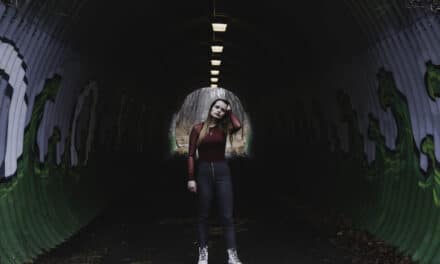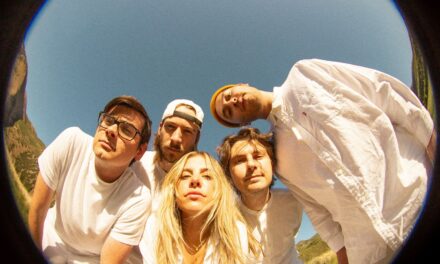Bay Area trio Bliss Abyss return with a radiant new transmission from the void: “Star,” a track that pulls their genre-bending identity into sharp focus while offering a luminous first look at their upcoming debut album. Premiered today via Post-Punk and now streaming everywhere, the single captures the band at a moment of bold emergence — grounded in decades of underground history yet unmistakably future-bound.
“Star was the first song that felt like a spell,” explains vocalist and guitarist Peter Wallner. “A vision of manifesting a life worth living. It’s meant to spark hope in anyone who’s lost. Picture the life you want, the person you actually are, and don’t let anyone’s bullshit block your light. You’re a star — perfect as you are, made from stardust, burning through the same abyss as everyone else.”
That blend of defiance, tenderness, and cosmic imagery is the emotional backbone of Bliss Abyss — a band where shoegaze fog collides with post-punk urgency, swinging between darkness and shimmer without ever losing their melodic pulse. Wallner’s voice cuts through it all with dreamlike intimacy, turning personal revelations into widescreen catharsis.
Though Bliss Abyss is technically new, its roots run deep through the Bay Area’s underground. Wallner has shaped the local scene for years, from his industrial-shoegaze duo Astronomers Anonymous and synth-punk project Whisper, to his drop-tuned “Lodge Goth” guitar work in Some Ember — a style inspired by the eerie romanticism of Angelo Badalamenti. Under the alias Peter Lightning, he also carved out a place in the cult-favorite post-punk group Wax Idols, later expanding his sonic palette even further as a touring keyboardist for Heaven’s Club, including a European run with Deafheaven in 2022.
Bliss Abyss itself was first born during the pandemic as a synth-pop experiment before gradually morphing into the tight three-piece that exists today. The turning point came when Wallner crossed paths with producer and bassist Joe Finocchio (also of the hardcore punk supergroup Culture Spy). After hearing Wallner’s early demos, Finocchio signed on immediately — shaping the band’s debut LP, which he describes as “an album of timeless singles.”
“Star” embodies that ethos completely: a euphoric, shimmering highlight that stands alone yet hints at the emotional worlds inside the forthcoming record. Across the album, songs shift between jagged post-punk burners, hazy melodic confessionals, and cinematic vignettes where heartbreak, desire, haunted objects, and feral instincts blur into something surreal and deeply human.
Joining Wallner and Finocchio on the project is drummer Josh Unger, completing a lineup that balances instinct with intention and mood with muscle.
If “Star” is any indication, Bliss Abyss aren’t just building songs — they’re building a universe, one where vulnerability glows, shadows breathe, and the abyss itself feels strangely alive.
Stream “Star” on all digital platforms now.
“Star” feels both intimate and universal — like a mantra for self-acceptance in the middle of chaos. Can you tell us more about the emotional space you were in when writing it? Was it truly conceived as a kind of spell, as you described?
Thoughts and words are powerful. Especially spelling words out, that’s why it’s called spelling. You are actually casting a spell. The song was written with my collaborator and long time friend Joey Weed. It was and is a response to seeing so many people’s basic human rights and needs taken away by tyrants. It has gotten to the point where just being yourself is a political act of rebellion. So what we are saying is to daylight your freak.
Your sound sits beautifully at the intersection of shoegaze, post-punk, and synth-pop —How do you balance nostalgia and innovation when crafting songs that feel “timeless,” as Joe Finocchio puts it?
I write what I want to hear. Overall what I find kills a song for me is the lyrics. Most lyrics these days suck and it can totally kill a song that I like. When lyrics are predictable or obvious, it can kill a song for me. But there are always exceptions to this where an obvious lyric just hits for some reason. I write pages and really explore ideas then boil it all down to the essentials and try to put a fresh take on things.
Peter, you’ve been part of so many iconic Bay Area projects — from Wax Idols to Heaven’s Club and Some Ember. How has each chapter shaped your current artistic identity within Bliss Abyss?
Each band had a “thing”, we were a goth band, or a post-punk band or a what have you band, that was the limitation. For Bliss Abyss, for this first album at least, I wanted to write whatever I wanted too, in whatever style I wanted – with the limitation being that it will be performed with drums, bass, guitar, and vocals only. I don’t want to pander to a genre by putting chorus on all the guitars, or drenching everything with reverb or stylizing it with typical effects. I want it to be good because it is good and doesn’t need a bunch of effects to sound cool. I’d rather choose the right notes to play that evoke the feeling I want to communicate.
There’s a cinematic quality in your lyrics — “dreamlike confessions,” “cosmic vignettes,” “haunted objects.”Where do these visual worlds come from? Do you see songwriting as a form of visual storytelling?
Absolutely, I try to show in my writing as much as possible. There is a song on the album called Purse. I made my friend dump out the contents of her purse and I listed them and those are the lyrics of the song. It’s like a sonic portrait of a person. Describing what’s in the bag tells so much more about a person than anything they could tell you directly. The things in the bag cannot lie. You might be deceived by them, but that’s all part of it.
The title “Star” itself suggests light, guidance, and self-worth. Do you think the song also speaks to a collective sense of healing or empowerment post-pandemic?
It sure could. And if it does for you that’s wonderful. I think it’s going to mean different things to different people. It’s so easy to get squashed down by all the things that stomp on us and then adopt a victim mentality about it. But fuck that, don’t be a victim, be a survivor. Don’t let trauma define you. I can hear my own trauma screaming at me, trying to pull me down as I say this. I know it’s hard. But I refuse to be a victim. Choosing to heal is a radical act of self worth.
The Bay Area has a long legacy of underground and genre-defying music. How does the city’s creative energy — and perhaps its melancholy — feed into the identity of Bliss Abyss?
There are so many incredible bands in the bay. It is so inspiring. Just last weekend I was at an industrial noise / house / electro-pop / punk show. Joe and I immediately started conceptualizing our heavy industrial band, who’s playing what, what instruments, potential band names, etc. I’d say that rather than the Bay Area music scene feeding into Bliss Abyss, Bliss Abyss is another expression of the Bay Area’s music scene.
You mentioned the project started as a synth-pop experiment and evolved into a full three-piece band. What was the turning point when you realized Bliss Abyss had become something larger — a true band rather than just a studio project?
My buddy Rob Good, of the band The Goods, asked to hear some of the songs I was writing. I remember thinking that all these songs were too odd, and didn’t sound like they came from the same place. But then Rob said, something along the lines of, these are awesome, you need to make this a real band. It was the kick I needed to dive in. So I got some friends together and taught them the tunes, and we played our first show at the Golden Bull. Which is where Joe Finocchio saw us and spearheaded recording our album.
Your music carries both urgency and serenity, often in the same breath. Is that duality something you intentionally chase, or does it emerge naturally from the songwriting process?
Absolutely intentional. There is another song on the album called Feral. The musical concept is that the guitar riff and vocal is very slow, like 90 bpm, and the rhythm section is fast at 180 bpm. I am already writing the second album and that concept is becoming a defining element of the band. One song has blast beats with slow arpeggio guitars and mellow vocals. Then tremolo picking and spars drums. It’s weird and awesome. A good example of writing the kind of songs I want to exist.
You’ve worked with producer Joe Finocchio in multiple creative contexts. What’s unique about your collaboration — what does he bring to Bliss Abyss that you can’t find anywhere else?
Joe understands the music. When he sent me the first mix of “star”, it was perfect, no notes. That is the mix that got released. He also brings really good ideas to the songs and can see the bigger picture and guide me out of becoming obsessive about something that ultimately doesn’t matter. I trust his judgement and when he tells me I’m wrong about something.
If “Star” is a glimpse into your upcoming album, what can listeners expect from the rest of the record? Are there particular themes or moods you’re excited to explore next?
Each song on the record is unique in its overall feel. No two songs sound the same. “Star” is the last song on the album if that tells you anything. There is a major theme of heartbreak, loss and being ripped apart by love and life. Accepting that life is also incredibly painful and that pain should also be savored and appreciated too. Pain teaches us so much and tells us so much about what we have the capacity for. Pain can guide us into or out of the abyss. The same way bliss can guide us. Life is about both, so appreciate both. Eventually, you won’t get to feel anything.





